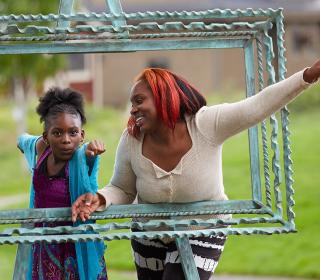Our environment has a direct impact on our health, but not every environment is equal. We heard from moderator Sally Jewell (Former U.S. Secretary of the Interior) and panelists Hannah Wilson and Jamie 真理恵 Stroble.
Stand Against Environmental Racism
The water crisis in Flint Michigan, the Dakota Access Pipeline oil spills, the concentration of heat islands in Seattle, pollution – although the effects of such crises are widespread, the unfortunate truth is that BIPOC communities are disproportionately impacted by the direct and indirect effects of climate change and environmental racism.

"YWCA is dedicated to ending racial disparities and fighting injustice. We stand together in the belief that all people, regardless of race, creed, or ethnicity, deserve to be treated with dignity, respect, compassion, and justice.”
- Alexandra Liggins, POCEC (People of Color Executive Council) Member
Sally Jewell spoke about environmental racism and Environmental Injustice through a lens of systematic racism. The way our country’s system is designed – a system based in colonization and exploitation for the sake of capitalism – makes it impossible for everyone to enjoy the same capitalistic privileges as those in positions of power. Structural issues have created and emphasized already existing issues, and our power structures perpetuate those injustices. Redlining and land use planning determines what communities are closer to high pollution areas like airports, what neighborhoods have access to green spaces, and what areas have easy access to necessary cultural resources.

"All the systems need to fit together to help people succeed in this world, especially people that don't have family or friends to fall back on in the way that so many privileged people have."
- Sally Jewell
Jamie 真理恵 Stroble shared her firsthand experience living in polluted spaces. “I lived in an apartment that was right next to I-5, like literally my bedroom window faced the freeway. I remember in the summers I would open my window because it was hot and I would get this layer of black dust that would accumulate on my windowsill, and I would just wipe it away thinking nothing of it. This is before I worked in air quality, before I worked in environmental issues, and I reflect back on it now and I’m like: I lived there because it was the cheapest place to live [...] That intersection of inequality and housing and land pollution and who lives where and why are all interconnected.” The decision of who gets to live where, and a lack of representation in the decision makers who determine where we put high pollution projects (airports, freeways, etc.) or resources (green spaces, where restoration happens, etc.) also contributes to this problem.

“We are in a role where we have such privilege and responsibility because we have access to power and resources, so how do we utilize that in a way to best support community and what they want to see, and help support their leadership in that work?”
Environmental justice and environmental racism are connected to our relationship to land and water, and that relationship has become problematic, especially with the history of our land being a place that has been occupied, exploited, and taken away from indigenous peoples.
With rising food prices, some people are resorting to growing their own food. However, Hannah Wilson points out that this is an imperfect solution because oftentimes, soil is too polluted for people to grow healthy nutritious crops. “I see food apartheid [being] very much tied into environmental justice. We need to have localized food systems that we can get food from. The ability for people to ‘be at the table’ is important, however it’s just as important for them to be able to build their own tables and be resourced to do their work.”

"We need to make sure that we’re taking care of ourselves in this work. We can’t burn ourselves out. We have to make sure that work itself is also healing. We are allowed to rest, we are allowed to take care of ourselves and our community when we’re doing this work, because if we’re trying to match the speed of white supremacy and capitalism, we’ll burn out really quickly.
If you missed the event live, you can watch a recording. Thank you again to all our partners, speakers, and community for continuing to stand with us in our mission to eliminate racism!
Sign up for our monthly newsletter to learn how you can take action to fight inequity today.
Ana Rodriguez-Knutsen is the Content Specialist for YWCA's Marketing & Editorial team. From fiction writing to advocacy, Ana works with an intersectional mindset to uplift and amplify the voices of underrepresented communities.
We share the stories of our program participants, programs, and staff, as well as news about the agency and what’s happening in our King and Snohomish community.


